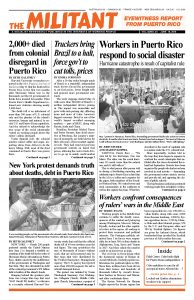After a 10-day strike brought much of Brazil to a standstill, independent truck drivers forced the government to cut fuel prices, lower freight tolls and promise more government contracts.
The work stoppage started May 21 with more than 200,000 of Brazil’s 1 million independent drivers joining in. The impact was immediate and grew with each passing day, affecting more and more of Latin America’s biggest economy. Brazil is one of the world’s largest so-called emerging markets — part of BRIC, along with Russia, India and China.
Brazilian President Michel Temer and Pedro Parente, then chief executive of Petrobras, the country’s state-run oil monopoly, are both known for their advocacy of free-market capitalist rule. They had removed previous government controls on diesel fuel prices, allowing the cost to truck drivers to go up to match world market prices. This led to the mass walkout.
Truckers put up hundreds of roadblocks, sealing off highways across the country. After the first few days gas stations ran out of fuel. Production and trade ground to a halt. Big cities like Sao Paolo became close to free of traffic. Airports only allowed planes to land that had fuel to fly out. Auto production nationwide shut down for a week.
But the truckers’ demands and their strike were widely supported. A May 29 Datafolha poll — eight days into the walkout — showed 87 percent backing.
Three days into the strike President Temer announced he had struck a deal with strike leaders, but the truckers didn’t move their trucks. A couple days later he issued an order authorizing the military to clear the roads. None of it worked. Finally, in a May 27 televised address, he announced the government had granted all the truckers’ demands and after a few days trucks began moving again.
“If they don’t keep their promises, we’ll be back,” Edelberto Gomes, one of the rank-and-file strike leaders, told the Financial Times.
The strike further weakened the already shaky and discredited government. Petrobras’ Parente resigned June 1. The state-owned oil company controls 90 percent of the oil and gas sector in the country.

